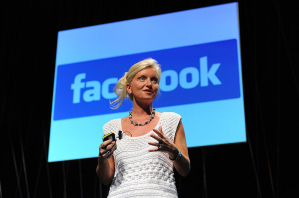
Carolyn Everson, Facebook's global advertising chief, appeared at the Strategic Execution Conference in Santa Clara, California last week and talked candidly with the audience about the company's mobile strategy, consumer expectations, and CEO Mark Zuckerberg's leadership style.
Appearing as a keynote speaker at the two-day conference, which was organized and run by the Stanford Center for Professional Development, Everson spoke about the need for speed as Facebook has transitioned rapidly from a desktop-driven social media platform to the mobile space. "Consumer expectations are ahead of a lot of companies," said Everson. "There's an urgency to serve the consumer."
When Facebook went public in 2012, the company had no mobile revenue from ad sales. Since then, the social media giant has steadily built a profitable business from the mobile advertising market, doubling profits from 2013 to 2014. "We had to completely pivot, literally within weeks, to become a mobile company," Everson explained.
The former MTV executive has been a key player in that transition. Everson was leading ad sales for the television network when she was recruited by Microsoft to build an advertising strategy for the software giant in 2010.
But her career at the company did not last long. Facebook was desperately looking for someone to jumpstart their ad revenue as they were about to go public, so a mere nine months after joining Microsoft, she left. This triggered the wrath of then-CEO Steve Ballmer and landed her in the tabloid press as a result. "You never want to be in the New York Post," Everson joked, yet indeed there she was.
Despite her successful rise in the technology world, Everson recounted what she termed a "crushing" setback early in her career. While attending Harvard, she created a business plan for a new company that would sell pet supplies online. This became the notorious Pets.com, a company that grew quickly in 1998 then crashed and burned two years later as the "dot com bubble" burst.
Everson wasn't around for the end. When the venture capital backers ordered her to hire an experienced CEO to run the company, she did and he promptly fired her from the business she created. "I still have scars from that today," Everson told the gathering.
In her current role at Facebook, Everson has also been working closely with Zuckerberg to stay close to the appetites of their users, which is why the company has been moving quickly and aggressively in building its apps portfolio. This accounts for the recent acquisitions of Instagram and What's App, along with the announcement last Thursday of a new service called Rooms where contributors can post anonymous messages.
"We believe that the companies who are the fastest, not the biggest, are going to be the most successful," said Everson.
She also described how Zuckerberg's personal management style has helped drive the culture at Facebook. According to Everson, the founder and CEO holds an open meeting with all employees around the world every Friday and gets upset when not enough tough questions are asked. "He's a very transparent leader," said Everson.
Facebook's global marketing executive believes that her company "still has room to grow" because of the significant amounts of money still being spent today on TV and print advertising, dollars that she expects will migrate to her mobile platform. Everson told the gathering that Zuckerberg is focused on "getting the next seven billion people online" and, if he's successful, the ad dollars may well follow.







